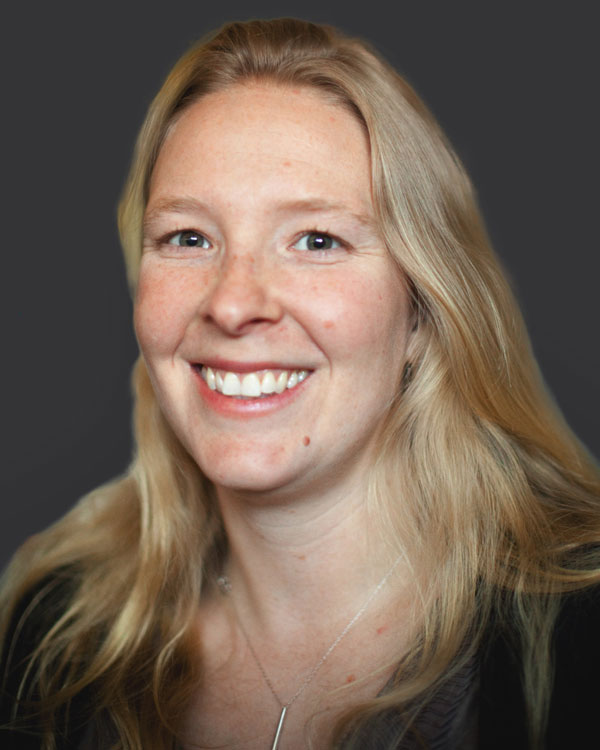

Oakley, Adrienne J.
Associate ProfessorPhysical Sciences
484-646-4334
Boehm Building 136
oakley@kutztown.edu
Website
-
Biography
Dr. Adrienne Oakley grew up in rural Connecticut, the youngest of three sisters. She attended Bowdoin College in Maine and graduated with degrees in Geology and French in 2001. Dr. Oakley received her PhD in Marine Geology and Geophysics from the University of Hawai’i Manoa in 2008. She is an associate professor in her 14th year at Kutztown University. Dr. Oakley teaches introductory and advanced courses in marine science and geology to a broad audience, many of whom are first generation college students. Her research focuses on deep ocean basins and coastal zones. In the deep ocean, she maps seafloor bathymetry and subsurface structure to investigate processes that occur within subduction zones. Along the coast, she studies the effects of sea level rise and environmental change on barrier islands and salt marshes. Her active research program at KU involves several undergraduates and is made possible through partnerships with the Chincoteague Bay Field Station, Chincoteague National Wildlife Refuge, and NASA’s Wallops Flight Facility.
Dr. Oakley served as the chair of the Academic Advisory Council for PASSHE's Chincoteague Bay Field Station of the Marine Science Consortium in Wallops Island, VA for 5 years. She is the coordinator for Kutztown’s Marine Science Program. Dr. Oakley is a 2019 American Geophysical Union Voices for Science Advocate in the Media/Public Communications track and serves on the board of the Eastern Section of the Society of Sedimentary Geologists. She is passionate about science communication and believes that conveying the value of science to non-scientists is critically important.
Dr. Oakley lives in rural PA with her husband, two sons, two dogs, two cats, a few fish, and a lot of plants. -
Degrees
University of Hawai‘i at Manoa, Honolulu, HI
PhD in Geology and Geophysics: December 2008
Dissertation: A multi-channel seismic and bathymetric investigation of the central Mariana convergent margin
Bowdoin College, Brunswick, ME
B.A. in Geology (with Honors) and French, May 2001. Summa Cum Laude
Thesis: The Seismic and Sedimentological Characteristics of the Upper New Meadows River, Midcoast Maine -
Research Interests
Current Research: Investigating the Effects of Sea Level Rise and Environmental Change along the Barrier Islands and Salt Marshes of the Southern Delmarva Peninsula
At Kutztown University, I have an active coastal marine geology research program involving undergraduates. My research group studies coastal processes: erosion and sediment transport, barrier island formation and movement, and salt marsh evolution and restoration on the Eastern Shore of VA on the Delmarva Peninsula. This region is experiencing sea level rise at twice the global average and is often threatened by large coastal storms such as hurricanes and Nor'Easters. As sea level continues to rise, coastal zones will experience more frequent instances of intensive erosion and sustained flooding that threaten existing infrastructure, natural habitats, and communities.
To create resilient and sustainable coastal communities, restore salt marshes, and protect infrastructure on barrier islands, we must understand both the current conditions along the shoreline and the underlying geologic history of the region.
This research project is a collaborative effort between Kutztown University undergrad students and faculty, Shippensburg University students and faculty, the Chincoteague Bay Field Station, US Fish and Wildlife Services (FWS), and NASA Wallops Flight Facility (WFF).
Our results have been included in environment assessment reports and have contributed to NASA’s decision to retrofit and relocate necessary infrastructure for both higher water table levels and future erosional events on Wallops Island. We are currently working with FWS to study and restore Swan Cove Pool, a tidal pool and salt marsh on Assateague Island.
Jurassic Ocean Crust Magnetic Survey
From November 4-December 17, 2011 five Kutztown undergraduate students joined me on an NSF funded Marine Geophysical research cruise. Along with researchers from Woods Hole Oceanographic Institute and Texas A&M, we journeyed to the Western Pacific to study the oldest seafloor on the planet with the goal of investigating the history of Earth's geomagnetic field.
You can read more about our expedition in our blog!
https://www3.kutztown.edu/JOCMS2011/blog.html -
Course Regularly Taught
MAR/GEL 110: Introduction to Oceanography + Lab
MAR 210: Sophomore Seminar in Marine Science
MAR 364: Physical Oceanography
MAR/GEL 366: Marine Geology + Lab
MAR 380: Senior Seminar in Marine Science
MAR 370: Research in Marine Science
MAR 390: Internship in Marine Science
Marine Geology, 3-week field intensive course taught at the Chincoteague Bay Field Station (CBFS), Wallops Island, VA
Oceanography, 3-week field intensive course taught at the Chincoteague Bay Field Station (CBFS), Wallops Island, VA
GEL 20: Introduction to Geology + Lab (non-science majors)
GEL 100: Physical Geology Lab





